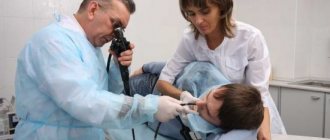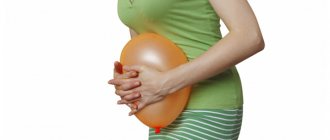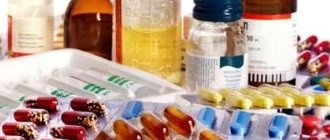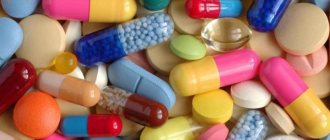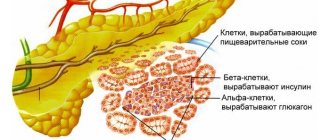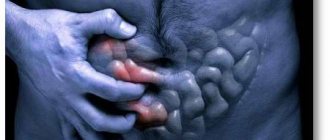How to treat intestinal disorder?
To figure out what to take for intestinal upset, you need to know what causes it. Most often this is:
- action of the virus. Diarrhea can be caused by adeno-, entero- and rotaviruses;
- action of bacteria. Bacterial infections include salmonellosis, dysentery, Pseudomonas aeruginosa, cholera, escherichiosis;
- intoxication. This could be poisoning from food, chemicals, household chemicals, or other substances;
- intestinal diseases. Diarrhea can develop due to enterocolitis, enteritis, ulcerative colitis, etc.;
Figure 3 - Dozens of factors can cause diarrhea
- lack of enzymes. When the body produces few enzymes, food is not completely digested. The composition of the microflora changes, the intestinal walls become irritated, and diarrhea becomes chronic. This occurs with cholelithiasis, pancreatitis, fermentopathy, congenital intolerance to nutrients and foods (for example, cow's milk proteins, gluten);
- autoimmune diseases. Most often, diarrhea is observed with food allergies, atopic dermatitis and even rheumatoid arthritis;
- bleeding from the intestines and other organs of the gastrointestinal tract (ulcers, fissures);
- tumors – diverticula, polyps, etc.;
- medicines. Diarrhea can occur during antibiotic therapy or after its completion, with the abuse of laxatives and cytostatics;
- stress and increased nervousness. This type of diarrhea is popularly called “bear disease.”
Figure 4 - How to treat an intestinal disorder depends on its cause
During pregnancy, diarrhea may occur on its own. This is due to hormonal changes and increasing pressure from the fetus on the intestines. The constantly growing uterus also puts pressure on the stomach, which often provokes heartburn and, less often, more serious digestive disorders. Only doctors should advise expectant mothers what to take if they have an upset stomach and intestines.
The general rule for treating diarrhea of various etiologies is to drink plenty of fluids and follow a diet. With bowel movements, the body loses a lot of fluid, which must be constantly replenished. Oral rehydration solutions work best for this. Their advantage over water is the content of sodium, chlorine, glucose, medicinal plant extracts, and cereal decoctions (depending on the type and dosage form of the drug). By taking such solutions, patients restore the balance of microelements (sodium, chlorine), gain strength (glucose), and soothe the intestinal walls (extracts, decoctions).
What to drink if you have an intestinal disorder? Lots of salted liquid.
Figure 5 - If you have diarrhea, it is important to drink a lot
To prepare a rehydration solution, you can use:
- powders and granules: Hydrovit, Glucosolan, Normohydron, Regidron, Humana electrolyte, Citraglucosolan;
- tablets: Gastrolit.
You can make your own oral rehydration solution. To do this, you need to dissolve 3 g of salt and 18 g of sugar in 1 liter of water.
What medications to take in the future for intestinal disorders, and whether they are needed, will be determined by tests and information collected by the doctor about the events preceding the onset of diarrhea.
Diagnostic measures
Diagnosis of the suspected pathology is carried out by a doctor after a preliminary conversation with the patient. The specialist finds out the nature of the disorder (acute or chronic), then takes stool for analysis and checks whether the problem remains if the person completely refuses food. A set of diagnostic procedures allows you to find out the exact cause of persistent diarrhea.
We recommend: What to do if you have pain in the right side and diarrhea?
If the disorder is chronic, you must quickly undergo the required blood tests:
- general;
- identifying the concentration of vitamin B12 (diarrhea when taking vitamins);
- Ca concentration level;
- folic acid level;
- checking the correctness and completeness of the functioning of the thyroid gland and liver;
- Fe concentration;
- study of biomaterial for celiac disease.
The causes of chronic diarrhea necessitate additional tests that will help confirm the diagnosis and prescribe adequate, effective treatment. Taking into account the patient’s complaints, the doctor prescribes special examinations:
- Ultrasound of the abdominal cavity.
- Colonoscopy, during which a biopsy of the intestinal mucosa is taken for further histopathological examination.
- X-ray of the abdominal cavity.
"First aid" for intestinal upset
While the cause of the intestinal disorder has not been reliably determined, the following will help alleviate the patient’s condition:
- drinking plenty of water;
- diet. Until the cause of diarrhea is determined, it is recommended to limit food intake as much as possible. You can eat viscous porridge, steamed or boiled lean meat;
- enterosorbents are substances that absorb toxins, poisons, irritants from the gastrointestinal tract and remove them out. Universal medicines for stomach and intestinal upsets - Polysorb, Enterosgel, Algisorb, Pektovit, Colistyramine, Smecta, Polyphepan, activated (black tablets) and white coal. For the intestines, there is no difference between black and white coal; both drugs are safe and effective. The only difference is that white coal adsorbs toxins more actively, so you need to drink much less of it (2-4 capsules of “white” versus 6-8 tablets of “black”).
For example, you can drink Regidron and activated carbon. But there is no need to rush into taking antidiarrheal drugs. If diarrhea is caused by poisoning or intoxication, you must first remove the harmful substance from the body, and then begin to deal with frequent bowel movements. If you stop diarrhea earlier, the harmful substances will be completely absorbed into the blood, and it will only get worse.
Figure 6 - Activated carbon - the most famous fighter against intestinal disorders
IRRITABLE BOWEL SYNDROME (IBS)
Irritable bowel syndrome is a controversial disease. The intestines stop working correctly for no apparent reason. Those. the organ looks normal - there are no organic disorders, but functions poorly. What does this mean? First of all, abdominal pain and stool disturbances. There are IBS with diarrhea, with constipation, mixed type and unclassified.
With IBS with diarrhea, the patient experiences frequent urge to defecate during and after meals, abdominal pain that goes away immediately after defecation, and difficulty urinating.
For a long time, doctors could not establish the exact cause of intestinal dysfunction, until in the 21st century, with the advent of new research methods, the cause was established. IBS is based on increased permeability of the gastrointestinal mucosa.
Complaints of abdominal pain, heartburn, bloating, bowel movements and other dyspeptic symptoms indicate increased permeability of the gastrointestinal mucosa. It is also called “leaky gut”. The mucous membrane is by nature a powerful protective barrier that prevents pathogenic bacteria, waste, toxins and various aggressive substances from harming the body. But she may suffer if the factors of aggression turn out to be stronger.
What are aggression factors? This is an unhealthy and irregular diet, smoking, alcohol, stress, poor environment, lack of sleep, taking medications, etc. Under their influence, the mucous membrane cracks like a car windshield when hit by a small stone. Such a mucous membrane can no longer properly protect the gastrointestinal tract; it allows dangerous substances to pass through, and these cause inflammation, impaired motor skills and the transmission of nerve impulses. A person feels this in the form of abdominal pain, constipation or diarrhea, and bloating.
IBS is treated comprehensively with gastroenteroprotectors and various symptomatic medications. The basis of therapy is a gastroenteroprotector based on rebamipide . This substance allows you to restore the mucous membrane of the gastrointestinal tract at all its levels and throughout, i.e. eliminates the cause of IBS. Thanks to this, the functions of the digestive system return to normal: problems with stool, pain and bloating disappear.
Studies have proven the high level of safety of rebamipide: only 0.54% of patients experience side effects, none of which are severe or life-threatening.
While rebamipide does the “repair work” with an eye to a complete cure, you can use the drugs to solve problems “here and now.” Diphenoxylate or loperamide will give an astringent effect. Painful sensations will be reduced by antispasmodics.
Tablets for intestinal upset
Antidiarrheal drugs (Loperamide, Phthalazol, Imodium Express, Lopedium, Stopdiar, Superilol) slow down the motility of the gastrointestinal tract, as a result of which diarrhea stops. They allow you to get rid of cramps for a while so you can get home or to the doctor. But to eliminate the cause of diarrhea, additional medications will be required, for example, in the case of a bacterial infection, antibiotics. For stomach and intestinal upsets, medications can be taken in the form of tablets or powders.
Papaverine, No-Shpa, Drotaverine, Papazol, Spazmalgon, Niaspam, Neobutin will help cope with spasm and the pain syndrome caused by it.
Tablets for stomach and intestinal upset are best taken with water or rehydration solution. Drinks that enhance peristalsis (coffee, tea, soda) are prohibited - they weaken the effect of the drugs.
Figure 7 - If you have an intestinal disorder, do not rush to take pills - first consult your doctor
How to treat intestinal upset after taking antibiotics?
Along with the harmful bacteria that cause the disease, antibiotics also destroy beneficial microorganisms. The intestinal microflora suffers most from their action. To avoid dysbiosis and associated intestinal disorders, when taking antibiotics you should drink probiotics, for example, Lactiale, Bifidumbacterin, Enterozermina, Linex or Hilak forte. If digestive disorders are systemic in nature, it is better to use synbiotics instead of probiotics, for example, Fluvir or Derma Pro. These are combination drugs that contain both prebiotics and probiotics. They are more expensive, but supply the body with more beneficial bacteria.
You need to take probiotics longer than antibiotics. For example, if the course of antibiotic treatment is 10 days, probiotics should be taken for up to 14 days. You need to take the probiotic at least 3 hours after taking the antibiotic. For example, if you take antibiotics at 8:00 and 20:00, then probiotics can be taken at 11:00 and 23:00.
Antibiotic-related bowel upset may begin 2 to 3 days after finishing treatment. In this case, you need to take a new drug for the intestines. For example, if you took a probiotic, you need to drink a synbiotic. Before this, of course, you need to consult with the doctor who prescribed the antibiotic, or with a gastroenterologist.
Figure 8 - Taking antibiotics is a common cause of diarrhea
It is best to select probiotics based on the results of stool culture. In this case, you will populate the intestines with exactly the bacteria that are lacking there. However, culture results have to wait 4–5 days, and diarrhea must be prevented as quickly as possible. Therefore, when prescribing probiotics, the decision is made almost at random.
Some patients prefer to use natural yoghurts instead of probiotics. This method of restoring beneficial intestinal microflora deserves attention provided that you are not allergic to milk. The main disadvantage of the method is that it is not known for certain which bacteria enter the body and their dosage. There may not be enough bacteria and diarrhea will still occur.
Diagnostics
The search for the cause of the disease is based on examination data, laboratory and instrumental research methods. The list of recommended methods is selected individually. Can be assigned:
- Coprogram. Assessment of the composition and consistency of stool.
- Sowing feces on flora. To identify the infectious agent of intestinal dyspepsia.
- Ultrasound of the abdominal organs. Allows you to exclude some secondary causes of intestinal dyspepsia (pancreatitis, gallbladder pathology).
- Endoscopic examinations (using an endoscope). According to individual indications. Colonoscopy (examination of the colon), sigmoidoscopy (examination of the rectum and part of the sigmoid colon). If pathology of the duodenum is suspected, an FGDS is performed.
- Biopsy. Usually performed as part of an endoscopy. Cleavage of a piece of intestinal tissue followed by microscopy. Method of choice for suspected tumors.
- X-ray of the intestines. Performed with contrast. Allows you to evaluate the patency of intestinal loops and their internal relief. Helps to detect wall formations.
Be sure to read:
Diet for diarrhea: nutritional principles, foods and menu for the week
How to treat intestinal upset caused by poisoning?
Poisoning is easily recognized by vomiting with a further increase in temperature. In this case, the most important thing is to remove the toxic substance and decay products from the body as quickly as possible. Therefore, do not rush to take Loperamide and analogues. Induce vomiting, rinse the stomach. Then drink any sorbent, for example, activated carbon, and try to drink as much as possible. For the first day, it is better not to eat at all, try to lie down more, especially if the temperature has risen. On the second day, you can start eating dietary foods: light broths, pureed soups with rice and vegetables, liquid viscous porridges, jelly. Anything that irritates the walls of the stomach is prohibited: soda, marinades, smoked foods, sweets, fatty foods.
In case of poisoning, the liver suffers, so at the same time as medications for stomach and intestinal upsets, you need to take hepatoprotectors (for example, Gepabene, Karsil, Ursoliv, Essentiale Forte N). Milk thistle seed meal is considered a good natural hepatoprotector, but if you have diarrhea, you should not take it - it will irritate the intestinal walls.
Figure 9 - Diarrhea during poisoning is a protective mechanism that removes harmful substances from the body



